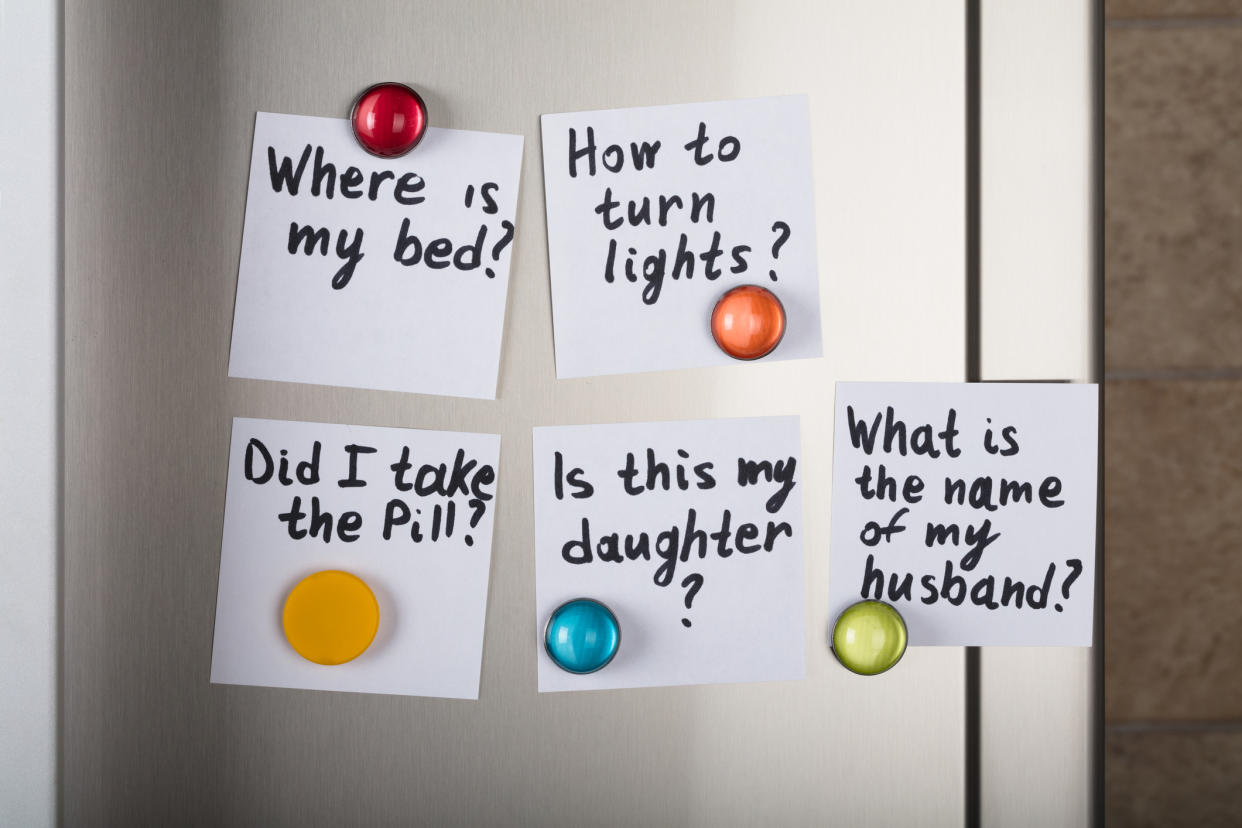Signs of dementia to look out for as Julie Goodyear’s husband says she’s ‘fading away’

Julie Goodyear's husband has spoken about the pain of watching his fun-loving wife "slowly fading away" following her dementia diagnosis.
Scott Brand has shared his experience of the condition in conjunction with a new Alzheimer’s Society campaign, featuring a TV advert voiced by British actor Colin Firth.
The advert, titled The Long Goodbye, highlights the heartbreaking reality of the disease's progression which causes loved ones to "die again, and again, and again".
This is something Brand says is echoed in his own experiences.
"I miss the fun-loving wife that Julie had always been – the larger-than-life personality that brightened up everywhere she went, and the smile that lit up every room," he said.
"All of this is now slowly fading away and it’s extremely painful for me to watch this deterioration.
"Julie now struggles recognising people and everyone she meets is called 'Scott'.
"Not being able to spontaneously go out as husband and wife, holding hands as we stroll along, going for meals together and going shopping – all these losses for me symbolise the Long Goodbye."

The 81-year-old was known for her trademark leopard-print clothing and glamorous looks both on and off screen, but Brand said dementia has caused her to lose interest in her appearance.
"Julie has always been extremely glamorous, going nowhere without her make up," he said.
"But now the lipsticks and make-up go unworn, and clothes are no longer of interest, especially the leopard print."
Brand initially revealed his wife's dementia diagnosis last summer.
"My darling wife and I have had to come to terms with this heart-breaking diagnosis," he shared in a statement.
"Unfortunately, Julie has been suffering forgetfulness for some time and we have been seeking medical advice and assistance, but we now know that there is no hope of a reversal in the situation – and that her condition will get progressively, and perhaps speedily, worse.
"We have taken the decision to publicly announce the diagnosis as Julie still loves visiting friends and eating out.
“Inevitably she is recognised, and fans love to meet her – and she them – but she can get confused particularly if she is tired. I hope people will understand."

What is dementia?
Dementia is a syndrome (a group of related symptoms) associated with an ongoing decline of brain function, according to the NHS. The condition can affect memory, as well as the way you speak, think, feel and behave.
There are many different types, with many different causes, and it is not a natural part of ageing.
Alzheimer's disease is the most common cause of dementia in the UK. It is a progressive condition, meaning symptoms develop gradually over many years, slowly becoming more severe.
The exact cause isn't yet fully understood, though factors that can potentially increase your risk include age, a family history, untreated depression and lifestyle factors associated with cardiovascular disease.
Signs and symptoms of dementia
As there are many different types of dementia each person experiences the disease in their own individual way.
However, according to Alzheimer's Society there are some common early signs and symptoms of dementia. These include:
Memory loss – for example, problems recalling things that happened recently
Difficulty concentrating, planning or organising – for example, struggling to make decisions, solve problems or follow a series of steps (such as cooking a meal)
Problems with language and communication - including difficulties following a conversation or finding the right word for something
Misunderstanding what is being seen – this could include problems judging distances (such as on stairs) or perceiving the edges of objects, and misinterpreting patterns or reflections
Being confused about time or place – for example, losing track of the time or date, or becoming confused about where they are
Mood changes or difficulty controlling emotions – for example, becoming unusually anxious, irritable, sad or frightened, losing interest in things and personality changes

As a person’s dementia progresses they are likely to experience additional symptoms including:
Aggressive behaviour – as a person’s dementia progresses, they may sometimes behave in ways that are physically or verbally aggressive
Walking about - This includes increasingly wandering around at home or leaving the house during the day or night
Lack of insight - when a person with dementia is unable to recognise changes in their behaviour and emotions
Sleep problems – As well as disruption to their body clock, a person with dementia may sleep more in the day and have difficulty falling asleep and staying asleep at night
Delusions – strongly believing something that is false
Alzheimer’s Society urges anyone worried about themselves or someone they love to take the first step and contact the charity for support.
Support and more information about a diagnosis is just a phone call or a click away. Visit alzheimers.org.uk/memoryloss or call 0333 150 3456.
See the checklist for possible dementia symptoms in full.
Dementia: Read more
Daily brisk walk or bike ride 'may reduce older people's risk of Alzheimer's' (Yahoo Life UK, 5-min read)
These are the key decades to get fit if you want to stave off dementia, study reveals (Yahoo Life UK, 2-min read)
Signs and symptoms of dementia as Bruce Willis wife opens up on actor’s condition (Yahoo Life UK, 8-min read)


